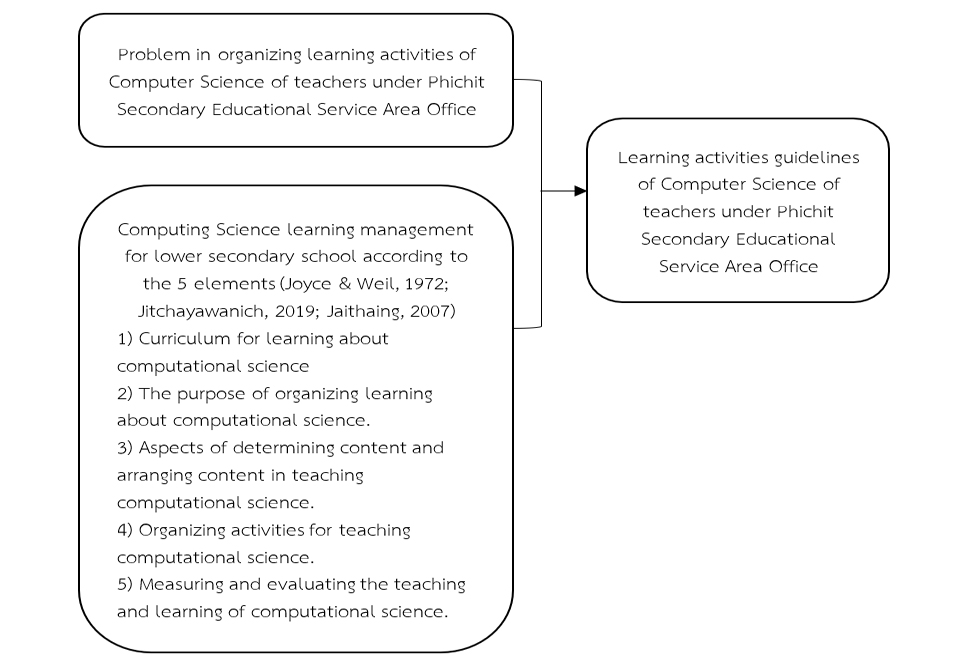Development of Learning Activities for Computational Science Teachers under Phichit Secondary Educational Service Area Office
DOI:
https://doi.org/10.14456/jcct.2025.2Keywords:
Learning Activities, Computing Science, ADDIE ModelAbstract
The objectives of this research were 1) to study the problems in learning activities of Computing Science teachers under Phichit Secondary Educational Service Area Office and 2) to study learning activities guidelines for Computing Science teachers. The sample group of this research were 30 Computing Science teachers under Phichit Secondary Educational Service Area Office. Which is selected by using the quota sampling method. The research material was a questionnaire on problems in organizing learning activities for Computing Science teachers. The statistics used for analyzing the data were Percentage and Mean. The research findings were as follows: 1) Problems in organizing Computing Science learning activities. was organizing learning activities with Computational Think concepts where a high score with the average value was 3.80. and 2) The result of learning activities guidelines of Computing Science teachers under Phichit Secondary Educational Service Area Office should use the ADDIE Model.
Downloads
References
Dongtanengineer. (2018). Computational Science. https://dongtanengineer.com/content/news/184. (In Thai)
Durak, H. Y., & Saritepeci, M. (2018). Analysis of the Relation between Computational Thinking Skills and Various Variables with the Structural Equation Model. Computers & Education, 116, 191–202. https://doi.org/10.1016/j.compedu.2017.09.004.
Fessakis, G., & Prantsoudi, S. (2019). Computer Science Teachers’ Perceptions, Beliefs and Attitudes on Computational Thinking in Greece. Informatics in Education, 18(2), 227-258.
Institute for the Promotion of Teaching Science and Technology. (2017). Manual for Using the Technology Curriculum (Computational Science) Science Learning Group (Revised Edition 2017) According to the Basic Education Core Curriculum, B.E. 2008 Technology Content (Computational Science) Primary and Secondary Level. Ministry of Education. (In Thai)
Jaithaing, A. (2007). Principle of Teaching (4th ed.). Odeon Store. (In Thai).
Jitchayawanich, K. (2019). Learning Management. Chulalongkorn University Press. (In Thai).
Joyce, B., & Weil, M. (1972). Models of Teaching. Englewood Cliffs.
Kuna, K. (2021). Analysing the Development Process of Teacher's Learning Management in Computing Sciences and the Effects on Students: Mixed Method Research. [Master's dissertation, Chiang Mai University]. https://cmudc.library.cmu.ac.th/frontend/Info/item/dc:161683. (In Thai).
Ministry of Education. (2017). Learning Standards and Indicators Mathematics, Science and Geography Subject Group in the Learning Subject Group Social Studies, Religion and Culture (Revised Edition 2017) According to the Basic Education Core Curriculum, B.E. 2008. Thailand Agricultural Cooperative Community Printing Company Limited. (In Thai).
Office of the Education Council. (2021). Guidelines for Promoting Teaching and Learning Management in Language Science, Mathematics, and Coding to Develop Learners' Skills in the 21st Century. 21 Century Print. (In Thai)
Pee Mint. (2018). New Semester, You'll Definitely Meet Them! Grade 1, Grade 4, Grade 7, Grade 10, You are the Lucky Ones. You'll be the First to Learn New Basic Subjects, Teaching Programming. https://www.dek-d.com/education/48514. (In Thai).
Richey, R. C., Klein, J. D., & Tracey, M. W. (2011). The Instructional Design Knowledge Base. Routledge.
Sadik, O., Ottenbreit-Leftwich, A., & Brush, T. (2020). Secondary Computer Science Teachers’ Pedagogical Needs. International Journal of Computer Science Education in Schools, 4(1), 33–52. https://doi.org/10.21585/ijcses.v4i1.79.
Santueankaew, A., & Chaowachai, S. (2021). Computing Science Learning Management Plan under the Secondary Education Service Area Office 37. Journal of MCU Nakhondhat, 8(3), 275–287. (In Thai)
Saraprang, W., Sinlapaninman, U., & Yonwilad, W. (2024). The Study of the Needs to Develop Computational Thinking Skills in Computing Science for Junior High School Students. Kalasin University Journal of Humanities Social Sciences and Innovation, 3(1), 52–67. https://doi.org/10.14456/hsi.2024.5. (In Thai)
Wang, M., & Wang, Y. F. (2016). A Study on Computer Teaching Based on Computational Thinking. International Journal of Emerging Technologies in Learning, 11(12), 72–74. https://doi.org/10.3991/ijet.v11i12.6069.
Wangsalae, S., & Swengam, W. (2021). Guidelines of Computing Science Instruction for Lower Secondary school. Journal of the Association of Researchers, 26(1), 116–132.
Yadav, A., Gretter, S., Good, J., & McLean, T. (2017). Computational Thinking in Teacher Education. In Rich, P. J., & Hodges, C. B. (Eds.), Emerging Research, Practice, and Policy on Computational Thinking (205–220). Springer International Publishing. https://doi.org/10.1007/978-3-319-52691-1_13.
Yasaka, S., & Suksakulchai, S. (2020, July 9-10). Study of Status, Problems, and Needs of Computing Science Learning Management. The 12th NPRU National Academic Conference, 2191 – 2199. Nakhon Pathom Rajabhat University. (In Thai)

Downloads
Published
How to Cite
Issue
Section
Categories
License
Copyright (c) 2025 Journal of Computer and Creative Technology

This work is licensed under a Creative Commons Attribution-NonCommercial-NoDerivatives 4.0 International License.






























